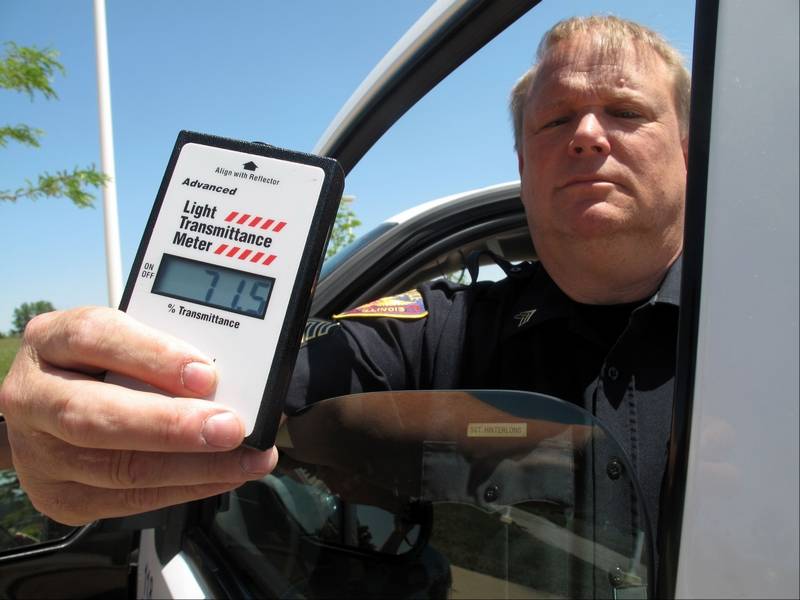Georgia Window Tint Laws
The state of Georgia has very specific laws regarding window tinting on your car. Every state in the United States has its own percentage of darkness and reflection permitted on car windows, as well as other specific regulations you may need to know about.
Georgia window tint laws summary:
Front windshield may only have top 6 inches tinted. Front side windows, back side windows and rear window may have 32% VLT on sedans. On MPV (SUV, trucks, vans) all windows behind driver may have any darkness.
Tinted windows in Georgia are also subject to other laws and regulations explained below.
Window tint darkness
The amount of light that can pass through your car windows is measured in percentages (called VLT). Your tint film must be within these standards.
Quick info: VLT stands for Visible Light Transmittance. 32% VLT means 32% of total light must pass through windows, or no more than 68% of total light may be blocked. Georgia permits 3% variance in light transmission.
Georgia window tinting laws have different regulations for passenger and multi-purpose vehicles. Make sure to read the laws carefully and check which apply to your vehicle.
- Windshield may only have top 6 inches tinted with non-reflective tint.
- Front side windows must pass through more than 32% of light inside your car (32% VLT).
- Back side windows can have 32% VLT on passenger vehicles, or may have any darkness on MPV (bus, van, SUV, etc.; more info below).
- Rear window must pass over 32% of light on passenger vehicles, but can have any darkness on MPV.
Passenger vehicles and MPV – Multi-Purpose Vehicles (or Multipurpose Passenger Vehicles) have different back side window tint restrictions. If in doubt about your vehicle type, find the federal ID label located on door frame next to driver’s seat.
Sources:
- Georgia Code – Window Tint (see section § 40-8-73.1 found in Title 40 Motor Vehicles and Traffic, Chapter 8: Equipment and Inspection of Motor Vehicles, Article 1: Equipment Generally, Part 4)
- Georgia Department of Public Safety – New Window Tint Law (2005)
- State of Georgia – Window Tint Exemption
Window tint reflection
Some tinting film can reflect incoming light, therefore further reducing glare and heat. Georgia does not allow using tinting film with any mirrored or metallic appearance above 20% for any windows.
Restricted tint colors
Georgia window tint laws also restrict the color of tinted windows. It is not legal to use colors red or amber in this state.
Medical exemptions
Some US states allow different window tint percentages due to certain medical conditions. You can submit an application to use darker window film if you suffer from medical conditions such as porphyria, xeroderma pigmentosa, or severe drug photosensitivity.
With medical exceptions Georgia permits installing high levels of tint darkness on windows. Medical exception certificate is issued by Georgia Department of Public Safety, and driver or other exempt passenger must always have the certificate in their possession while the vehicle is in operation.
To obtain a medical exemption certificate you will need to submit a note from your physician or optometrist and pay a $10 processing fee. The form is located on this link: Medical Exemption Application (.pdf file).
Window film certificate
Georgia window tint laws do not require tinting film to be certified, nor any labels to be displayed. However it is highly recommended to affix a legible label between tint film and glass on each tinted window.
At a minimum, window tint installers should affix the label between the sunscreening device and lower rearward corner of the driver’s left side window. This label should be clearly visible and legible from outside the vehicle.
Penalties
Violating Georgia window tint laws is considered a misdemeanor. If a police officer issues you a ticket, you will have to pay a $25 – $300 fine. Exact financial penalty depends on county.
This article only covers state-wide tinting laws in Georgia. We only referenced official sources and summarized the data for your convenience. If you have any doubts about Georgia tint laws or found different information on other unofficial sources, be sure to check with your local law enforcement or DMV offices.
